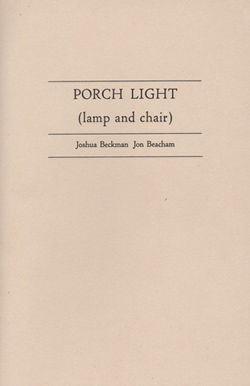
Reviewed December 14, 2012 by Joshua Marie Wilkinson.
Three years since his last full collection of poems, Joshua Beckman returns with Porch Light (lamp and chair)—this time pairing short poems with Jon Beacham’s lovely collages. It’s an elegant letterpress edition, “sewn and bound by hand by” the poet and artist themselves—and limited to just three hundred copies. I’ve read Porch Light a few times, and I’m still trying to figure out exactly what makes these poems tick.
One of the things I’ve loved about Beckman’s early books—and it was taken to new heights in books like Shake and Take It—is a kind of songlike apostrophe of the quotidian. Beckman, at his best, has this sort of plaintive, Whitmanic exuberance. Few poets have written so well of joy and pleasure as Beckman has. Stevens, Williams, and Niedecker of course did—to say nothing of Ginsberg’s frothing glee—and there are bits and pieces of all four of those poets here. The meditative quality of focus in early Stevens, paired with Niedecker’s determined attention on how to say the world seen without polishing out ordinary speech, vernacular, and idiomatic locution. And that hopped up revelry in Ginsberg (so present in Beckman’s other works) is now traded in for the sparest lyrical moments more like Spring and All than Howl.
If I seem bent on connecting Beckman’s poems to bygone eras it’s because he seems so perfectly out of step with his contemporaries—although Michael O’Brien’s and Merrill Gilfillan’s recent books both come to mind as counterparts to Beckman’s verse. Here is the book’s first poem in full:
Stars
that form from bells
planes that act
like stars
drunk blue
palette of early
night
in which
an electric
light swings
over the yard
it is a branch
There is a lot to like in this poem: its sparseness; its punctuation traded in for enjambments; and the pleasures of how the poem encounters in language what it sees and how it sees. There’s a lovely chiasmatic fusion in the opening: “Stars / that form from bells / planes that act / like stars”—and the most impressionistic lines (“drunk blue / palette of early / night”) offers a stripped clean meditation in just six words.
The final break in the closing strophe or phrase jars us out of what the speaker sees and what is thought to have been seen. Here the poet is closest to those short poems by Williams—where the impressions of the speaker are wrong or aslant or just off—and all the delight comes from the poet recording this slantwise, even correcting himself in “it is a branch.” And note those two or three spaces of indentation here. Beckman’s subtle choices are apt—and easily overlooked—as this phrase dismisses what’s come before—as though this reverie-filled language of “drunk blue” and “palette of early / night” are just a plain old “branch.” The poem closes with the obdurate, unadorned, and even featureless aspect of nature—communicating nothing but the fact of itself. It’s the opposite of how a Mary Oliver poem works (and she has poems I admire): instead of starting with some simple metonym that the speaker spirals into figurative, lavish description to close in on some revelation about memory or consciousness, for Beckman the starkness of what’s confused unravels into the simplest language possible by poem’s end: “it is a branch.” And it’s funny, a little awkward—sort of striking even—because Beckman is a master of creating the context to jar us with ordinary language.
Here’s another example, from the following poem:
Crackle crackle
little hails on my hat
clicking their notes atone
hear this: an awning to
bounce off of, and the things
you saved up
for dreams came down speaking.
The structure of this short poem is remarkable: beginning with an onomatopoetic verb and ending with “speaking.” Beckman loves a kind of wide open, chiasmatic structure (A-B-B-A), almost like a mirror, as the poem returns where it began, but by reversing it, the speaker is altered (instead of “little hails” coming down its “dreams came down”—where “speaking” parallels that initial “crackle.”) It’s a biblical trope, and yet Beckman makes it work in a secular or domestic idiom over and over again mostly because of its ordinary speech, like “little hails” instead of hail stones. The world’s made new because the language used to animate it is slightly off—almost childlike in those opening lines.
The best thing about Beckman’s new poems is that they don’t try to overdetermine their images into rarefied poetic speech. And I realize—after reading his new book again—how much other poems—especially poems concerned with nature—often sound like “Poetry” with a capital P—and how virtually nothing in Porch Light sounds like that. Meditative and pastoral even, but their beauty is their sparseness colluding with their spoken, awkward qualities. As he writes elsewhere in Porch Light: “It’s a silly betrayal / of my own thoughts / to invent or remember,” and so the poet records differently here, all the while toggling between both definitions of “betray.”
One of the finest aspects of Porch Light—as an object itself—is the back cover of the book, which, though the book is unpaginated—and most of the poems are untitled— serves as a sort of table of contents collage as well as a found poem itself. Printed gorgeously (handsome in off-white pages as well as full-color reproductions of Beacham’s austere collages), it looks like one of the recent Wave Books titles designed by Jeff Clark—and that seems to be part of the intent: let the poems and artwork stand for themselves through the minimal design. And they do. Beckman and Beacham have collaborated to make that rare thing: an object to behold, treasure even.